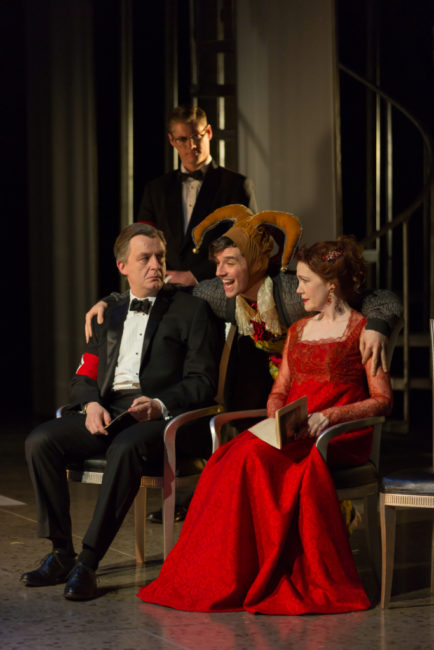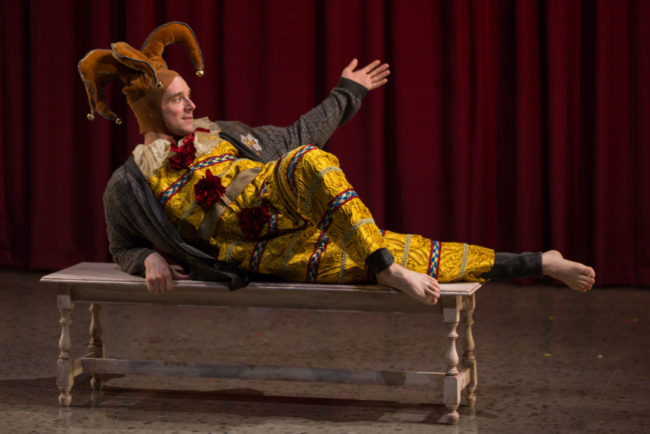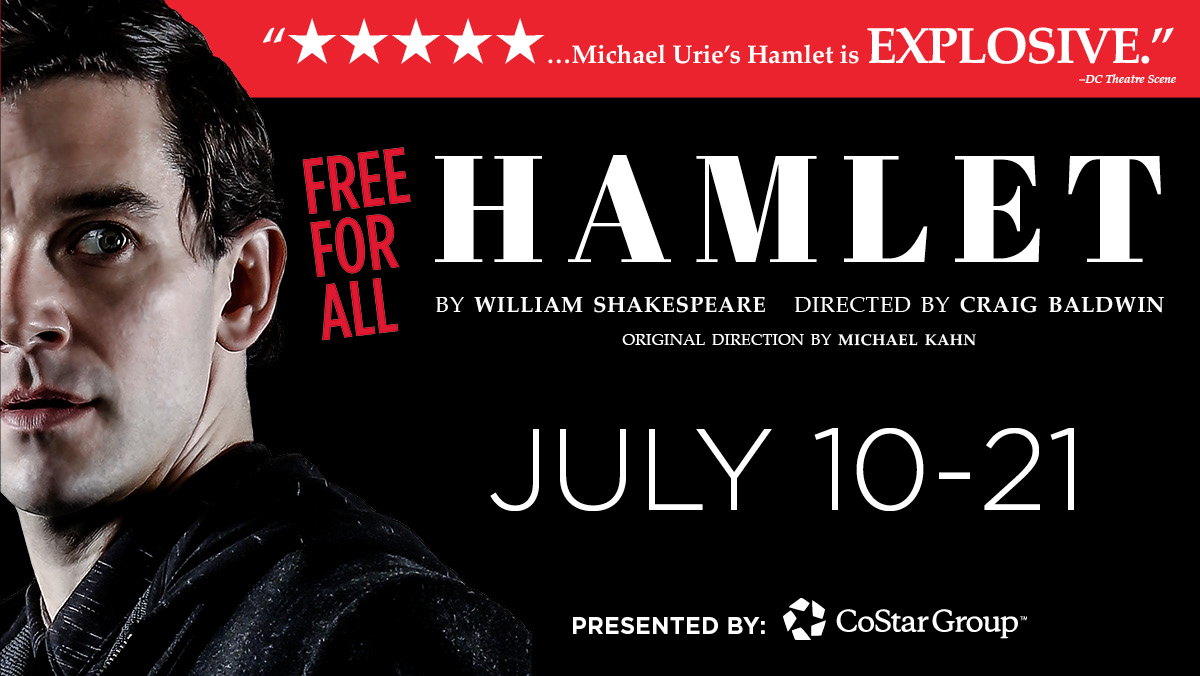Shakespeare Theatre Company brings its Summer Free For All program to life for a 29th season, this year reviving its 2018 production of Hamlet, originally directed by Michael Kahn and remounted by Artistic Associate Craig Baldwin, and starring Michael Urie as the title role. The show is a power-packed run at over 3 hours, but a scattered performance from the cast and an incohesive design leaves the audience feeling every minute of it.

The production is set in a nebulously-modern world, littered with cameras, security agents, and spies. The set itself, designed by John Coyne, is spare and sharp, consisting of several cat walks, a few aimlessly rotation panels, and a stained-glass logo tacked in the upper corner of the proscenium as an after-thought. The logo itself is an ambiguous attempt at branding for this version of Denmark, which at times seems like it’s meant to be a multi-million-dollar corporation, and at others, a fascist state, complete with armbands, never settling on one or the other. The lighting, from designer Yi Zhao, is equally at odds with the stage, undermining tense moments by leaving things invisible or overly lit.
Urie as Hamlet gives a performance as motley and disparate as his own jester-suit-plus-oversized-sweater costume. Constantly overreaching for emotional bombacity, his performance never comes down from 11. Even in a moment when visibly contemplating suicide, Urie brandishes a gun and flails frantically. The play opens with a speech pulled from later on, Hamlet’s “Oh that this too, too solid (or sullied, for quarto fans) flesh would melt…” Urie begins with a manic, yet thoughtful take on this speech which serves surprisingly well as exposition, and moving this speech was one of the few artistically imaginative moments. Unfortunately, this moment was the highlight for Urie’s performance, which is played like an unleashed, pouting child – never once keeping his hands still, and sloppily leaning against on-stage scrims, leaving them wobbling around for minutes after.
The rest of the production equally provides little thought or interest. The fear and ominousness that shrouds the first scene and the ghost’s arrival is played off flippantly as bored security guards in an office, and the audience laughed its way through the first act, though never, notably, at the actual jokes.
A moment of creative insight came at the end of the first half, a full two hours after the start, when a looming Claudius can be seen ordering the death of the Player King for what he might know. While an interesting touch, it felt dramatically at odds with the Claudius we had seen up until then, played by Alan Cox. The newly-crowned King played a constant wacky-Uncle type, completely disconnected from his own work, his precariousness, and his own past. Contrastingly, Madeline Potter’s Gertrude clearly had somewhere she’d rather be, as she floated forgettably through the show. Polonius (Robert Joy) showed no insight to the role beyond dottering and elastic, seeming unusually distant from his children, even by the role’s standards. His children, Laertes (Paul Deo Jr.) and Ophelia (Ayana Workman) are at polar opposites. Deo Jr.’s Laertes was a rare shining moment, providing intense power and presence, while Workman’s Ophelia was often not even audible.

Meanwhile, talented actors littered the show’s smaller roles, often upstaging the main cast. Hamlet’s speech to the players was grimace-worthy when delivered to the powerful Chris Genebach as Barnardo/Lucianus. Similarly, Rosencrantz and Guildenstern (Tim Nicolai and Kelsey Rainwater) shone as Hamlet’s oft-abused and bright-eyed friends.
Shakespeare Theatre Company’s Free for All Hamlet is bombastic but sloppy, and swaths of the audience could be seen walking out at intermission. As a free production, there’s nothing to lose and certainly a few moments that are worth the effort, but a better choice may be to wait for the next production of Hamlet to come along.
Running Time: 3 hours with one intermission
Hamlet plays through July 21, 2019 at Shakespeare Theatre Company’s Sidney Harman Hall— 610 F. Street NW in Washington, DC. For free tickets to the Free-For-All production, click here.

